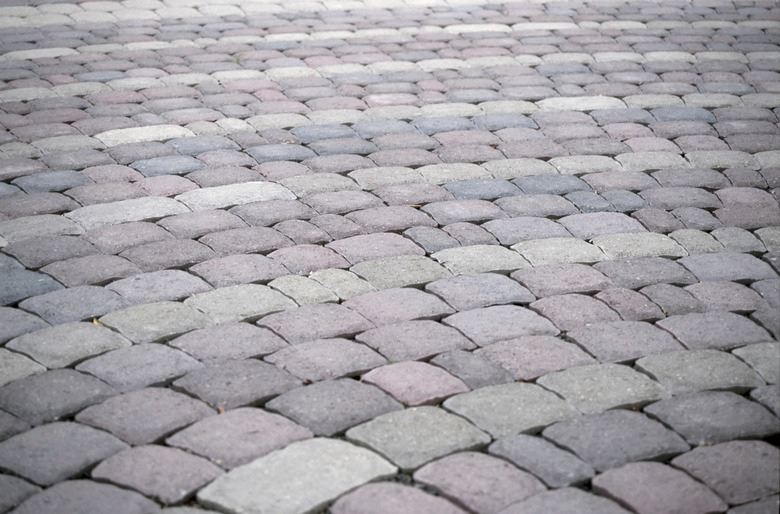What Should My Concrete Pavers Weigh?
We may receive a commission on purchases made from links.
Permeability is one advantage of using concrete pavers for patios, walkways and other outdoor surfaces you might otherwise cover with concrete or asphalt. When set on a bed of quick-draining gravel and coarse sand, concrete pavers make a strong and enduring packed surface that allows water to drain through to recharge underground water supplies. The ideal weight and thickness of the concrete pavers you'll install depends on whether you'll be walking on them or driving on them.
Advantages of Concrete Pavers
Advantages of Concrete Pavers
Concrete pavers offer many advantages, including low cost, no maintenance and ease of installation. Manufactured under intense pressure for maximum density and strength, pavers are four times stronger than poured concrete of the same thickness. They are functionally quite flexible, however, given the joints or spaces between them, which allow them to "float" with ground movement — including the freezing and thawing common to cold climates — to prevent cracking and breaking. They are more durable than asphalt and much more attractive, available in countless colors and designs.
Determining Paver Weight
Determining Paver Weight
Manufacturers or retailers can supply per-unit and pallet weights for pavers, in addition to individual paver size measurements. This information makes it relatively easy to compare weight. In the absence of detailed information you can make educated guesses about paver weight. Pavers that are 1 inch thick weigh about 11 lbs. per square foot, and 2-inch-thick pavers weigh twice that, or about 22 lbs. each.
Heavy or Thicker Concrete Pavers
Heavy or Thicker Concrete Pavers
Concrete pavers 2 or more inches thick are typically used for parking areas, driveways and other flexible pavements designed to withstand the weight of cars and trucks. Not only does the extra thickness add weight and strength, it also provides enough vertical surface between pavers to help lock them in place when they are set in a coarse sand bed so they won't move due to vehicle weight or movement. Vehicular pavers not only need to be thicker and heavier than pedestrian-grade pavers, they also need greater abrasion resistance and flexural strength, which means the ability to resist breakage at points of particular pressure, including the force exerted by the heels of high-heeled shoes.
Light or Thinner Concrete Pavers
Light or Thinner Concrete Pavers
Lighter, thinner pavers — those between 1 inch and 2 inches thick — are generally suited to garden paths, walkways, patios, steps, porches and pool decks. You can use them decoratively to create new facades on concrete planters and raised beds to connect these and other landscape features into overall pavement color and design schemes. Install thinner pavers indoors too, to create almost seamless connections between exterior patios, open-air courtyards and interior living spaces.
